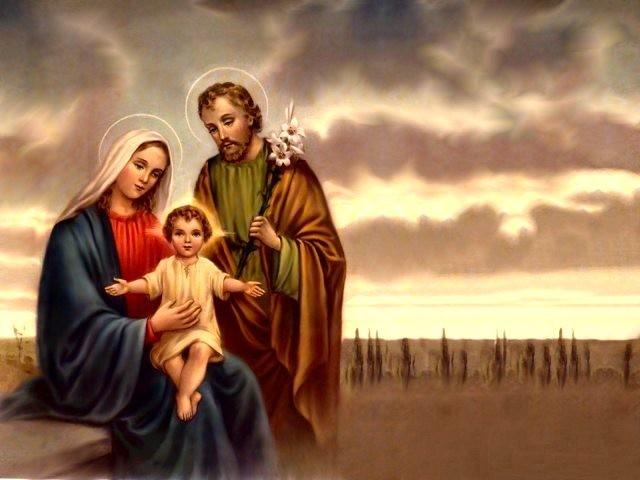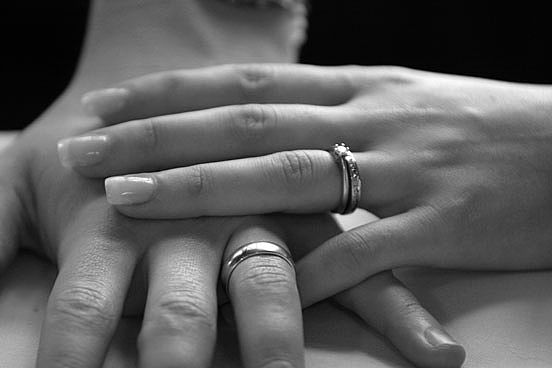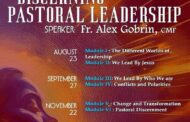One cruel doubt
Matthew tells us, in the story of the infancy of Jesus, how Joseph was at the point of divorcing his wife Mary, when he came to know that she was pregnant and that the child was not his.
The text says it this way: “Mary his mother had been given to Joseph in marriage but before they lived together, she was found to be pregnant through the Holy Spirit. Then Joseph, her husband, made plans to divorce her in all secrecy. He was an upright man, and in no way did he want to discredit her. While he was pondering over this, an angel of the Lord appeared to him in a dream and said, “Joseph, descendant of David, do not be afraid to take Mary as your wife. She has conceived by the Holy Spirit and now she will bear a son. You shall call him ‘Jesus’ for he will save his people from their sins…When Joseph woke up, he did what the angel of the Lord had told him to do and he took his wife to his home” (Mt 1:18-24).
Christians always have a disconcerted feeling about the dramatic moment that the Holy Family took to live, and they have asked themselves: Did Joseph really doubt the honesty of his wife? Did he think that she has been unfaithful with another man? How much time has he lived tortured in silence, without knowing that the son that she carried in her pregnancy came from the Holy Spirit, until an angel told him the truth? And why did Mary not tell him about it, if nobody had prohibited her to do so? Why did God announce the virginal pregnancy only to her, and not to Joseph, only to humiliate him? And why did Joseph want to abandon her in secret?
Matrimony in two parts
Without coming into the point of presenting to us the veracity of this episode (that it can be said to be historical or not), yes we can intend to respond to these questions stirred up by the story of Matthew.
For this, we have to take into consideration the matrimonial customs of that time. The Jews get married early: at 18 years old for the young men and at 13 years old for the girls. It is the rabbis themselves who assure that “God curses the youth, who at 20 years, still is not married.” And because of such very young ages, the parents did the election of the pair. In order to justify this custom, the Israelites said that it was God Himself, who is in heaven, which made the matrimonial union actual, forty days before the birth of every child and later communicated it to the parents. But yes, it is possible that in some cases, the youths choose their future wives.
Having made the choice concrete, they realized the first phase of the matrimony, called by the rabbis quidushin (that means, “consecration”). It was a kind of a formal commitment wherein the young maiden remained consecrated for always to the groom, but they could not live together owing to their young age, and that the spouses almost did not know each other.
The period of quidushin lasted generally for one year. The youths were considered as true spouses already, to the point that if she came to be united to another man, she turned herself to an adulteress; and if she came to die, the groom was taken to be a widow.
When the year of the quidushin elapsed, the second part of the matrimony took effect. This is called nissuin, in which after the great feast that lasted for some days, the young maiden would be escorted in a procession to the house of her husband in order for them to start living together.
The dark night of Joseph
It should have been, then, within the quidushin and the nissuin, that is to say, between the first and the second phase of the matrimony, when Mary became pregnant of the Holy Spirit. Matthew specifies this: “Mary his mother had been given to Joseph in marriage but before they lived together, she was found to be pregnant through the Holy Spirit” (Mt 1:18-19).
What happened then between the holy couple? We do not know. Matthew does not say it. We can only imagine the drama that Joseph lived, tormented by the suspicions of infidelity of his wife, this anguish that God did not have the kindness to spare. And the grief of Mary, seeing the suffering of her husband, but she was silent because she was afraid she would not be understood.
This period in the life of Joseph and Mary thrilled the spirit and the imagination of Christians, that some pursued to amplify these dramatic moments by way of new accounts.
The painful dialogue
One of these accounts can be located in the apocryphal gospels entitled the Proto – Gospel of James. In this, he tells of Mary, who was visiting in the house of her relative Elizabeth, noticed that her belly was growing day after day. Distressed, she undertook the way back to her city and hid herself.
Seven months of her pregnancy has elapsed when Joseph returned from a long working trip and found Mary pregnant with a child.
Crying bitterly, he reproached her: “Why have you done this? Why do you disgrace your soul in this way, you who have been reared in the Temple of God, and received your nourishment from the hands of an angel?” But she responded to him crying: “I am pure. I have not had a relation with any man.” Joseph told her: “From where came therefore what you have in your belly?” And she responded: “I swear to you for the life of the Lord, my God that I do not know where this has come from.”
But things became more complicated for the poor Joseph, because the next day, his friend, informed of the status of Mary, denounced it before the high priest saying: “Joseph has violated the virgin that he had for custody, and in secret has consummated the matrimony.”
The bitter waters
The high priest ordered that both spouses be escorted to the Temple and there, with hard words, accused them of having failed in their word. But as they were crying and swearing by God that they were innocent, the high priest resolved to subject Mary to the test of the “bitter waters.”
What was the test of the bitter waters? The book of Numbers (5:11-31) commands that, if a husband suspected the fidelity of his wife and had not shaped to ascertain the truth, this should bring his wife to the Temple to subject her to a test. There, in the presence of witnesses, would loosen her hair (since all decent women in Israel wore their hair gathered in a bun so that nobody could see it), in a manner of dishonoring her in public. Then the high priest would take a glass with water and mixed it with soil taken from the ground. Later, he would write with ink in a sheet of paper a series of curses and oaths, and the water from the glass would be drenched over the paper. Then the liquid would be collected again, and the woman would be made to drink it, while the high priest would be saying this: “If you have been unfaithful to your husband, if you have had relations with another man and have come to make yourself impure, you would be turned by God into an example of a curse before the people, and would make your thighs drop and your belly swell.”
It was evidently a treatment of a macho legislation that ended always in giving the reason to the husband; for whoever woman takes this kind of drink, finishes already intoxicated and with the belly swollen. But according to the apocryphal writings, when Mary drank the glass, an unexpected splendor appeared over her countenance, and her face was transfigured in a way that the witnesses who presented the judgment could not look at her face to face. By this, everybody assumed that Mary was innocent.
The reasons of the just Joseph
This long story of the apocryphal writings shows us even to the point of stimulating the imagination of the first Christians before the paradoxical episode that placed Joseph doubting unjustly his virginal spouse.
But we come here to the point, darker and more mysterious than the rest of the whole story. Why did Joseph decide to abandon Mary, leaving her alone and exposed in the worst moment of her life? Matthew said that because he was “just.” But, what does he have to show his justice with this deed of abandoning his wife?
There are two theories that have been proposed to explain the justice of Joseph. According to the first, Joseph believes that Mary has committed adultery. Well now, the law of Moses commanded that the adulteress should be repudiated by her husband (Deut 22:20-21). And since Joseph was just; it is to say that he complies with the Law; he decides to repudiate her (to abandon her) to comply with the Law. Take note that according to this theory, “justice” means compliance to the law.
But this hypothesis collides with an inconvenience. The Law ordered to the husband to repudiate publicly the unfaithful wife. And Joseph decides to repudiate her in secret. Hence, he was not complying with the Law of Moses. How then can he be called just?
In the second theory, Joseph believes that Mary has committed adultery. But he knows that the Law commands to stone the adulteress until they die. Therefore, since he is “just,” is to say, righteous, and he does not want her to suffer, he abandons her; yes, but in secret so as to save her life. Hence, according to this theory, “just” means righteous.
But this hypothesis also presents difficulties. If Joseph wants to abandon Mary in secret because he is good, he should not be called “just” but righteous. Why then does Matthew say that he is just?
The third theory
None of the two theories, then, explains satisfactorily why Joseph wants to abandon Mary. It is for this reason actually, that the bible scholars have proposed a third that, apart from harmonizing better with the context of the account, it has the credit of shedding a new light about Joseph.
According to this, Joseph knew about the mystery of Mary ever since. Since the beginning he knew that the child that his wife was carrying in her womb was the son of the Holy Spirit. For this, he never thought that she had deceived him. This deduces it to the way as we see how Matthew commences his story. In effect, this said: “The birth of Jesus Christ was like this: Mary was engaged to Joseph. But before they lived together, she was found to be pregnant through the Holy Spirit.”
As we see, it starts with these three facts: a) that Mary was engaged to Joseph; b) that they did not live together; c) that she was pregnant through Holy Spirit. And we normally suppose that Joseph knew only two of these data: the first and the second. But not the third, and why not? Why, if Matthew enumerated the three data together and later presents Joseph analyzing this dilemma, he goes to know only two of these data? It is logical that, according to Matthew, Joseph knew the three information.
How did Joseph know of the virginal pregnancy of his wife? Matthew does not say. But neither does he say how Mary was informed about it (Luke is the one that tells that the annunciation was by way of an angel). Therefore, it is possible to think that for Matthew both of them came to know of it in the same manner.
It was another notice
A last problem rests. Why did an angel inform Joseph in a dream that the child that Mary awaits is of the Holy Spirit, if he already knew it? In reality the words of the angel were erroneously translated in the Bible. In effect, it sounds this way: “Joseph, have no fear to take Mary with you, you wife, because what she has conceived comes from the Holy Spirit. She will give birth to a son, to whom you will give the name Jesus.”
But, as affirmed by many bible scholars, the Greek gar and de that appear in this phrase, have to be translated to English not as “for”, as what is written in most of the Bibles; rather with “for even though”. By this way, the message of the angel changed totally, and stays like this: “Joseph, have no fear to take Mary with you, for even though, what she has conceived comes from the Holy Spirit, she will give birth to a son to whom you will give the name Jesus.
Therefore, what the angel tells Joseph is not the divine origin of the child (something that he knew already), but that he should stay with Mary to give the name to the child (something that he did not know).
A plan for the two
With this new perspective, we manage to understand the account of Matthew.
Joseph and Mary, two young Israelites of 18 and 13 years respectively, were engaged. They had accomplished the first phase of the matrimony, that is to say, the quidushin, and they waited soon for the time that they can live together to comply with the stipulated term. But within this time, Mary happened to be chosen by God to be the mother of God’s divine Son. Having known about it, Joseph found himself faced with a serious problem. He had chosen Mary to be, yes, his wife, the mother of his children, his companion. But now he realized that God also had posted her, and God had also chosen her as the mother of His Son.
How can he compete with God for the love of a maiden? Could he take God as a competitor? No. Neither could he take in to himself a son who was not his, but who comes from heaven. It would have been an injustice.
And here, therefore, the decision of Joseph becomes clear. Since he was a just man, not wanting to take as his a son who belonged to God, and seeing also that God had elected this same woman for Him to initiate the plan of salvation, Joseph decides to free his wife from the engagement they had contracted and then divorce her in secret.
And he had decided this, when in the dream the angel appears to him and told him not to be afraid (it is to say, doubts) to take Mary as wife (it is to say, to celebrate the nissuin). Because even though the child that she awaits came from God, he will give him the name of Jesus upon his birth.
In other words, God asks Joseph to stay together with Mary. Though she has been elected for God, he too, has been chosen; he also forms part of the plan of salvation. And what is his mission in all of this? He would be the one to give the name to the child, it is to say, to consider the child as his own, to assume him as his own. Since he belongs to the descendants of the family of King David, if he adopted him as his son, it could make Jesus a “descendant” of David, a son of David”. And introducing Jesus in the genealogy of David, made the prophecies proclaimed about Jesus come true.
Reclaiming Joseph
We always have a sad and discolored image of Joseph. We imagine him as a poor man (even an old man), gentle and persevering, who when month after month saw his wife’s belly grow, disoriented and ridiculed, struggled between trusts and doubt, between love and jealousy. Incapable of understanding the mystery of the incarnation–the reason why Joseph was kept in ignorance. But this is not the. Joseph of the Gospel. Joseph never had any doubt about his wife Mary. He knew everything since the beginning because he was as mature as wife.
Today, Christians have enormously honored Mary, but not Joseph. In the Liturgy we have many feasts of the Virgin, but only two of Joseph. Even studies on Mariology give the impression that Mary had not been married that she had been sanctified outside the context of matrimony and the like. Our devotions, images and paintings are centered exclusively on Mary, and neglect Joseph. We have separated what God has united.
But Mary and Joseph loved God as a couple. They have been sanctified together, one with the other. One is a grace to the other. They were together since the beginning. For this, in a day where many families pass through moments of crisis, where many marriages make water by all sides, and that the Church does not dispose any conjugal model; it is proper to remember Joseph to whom God wanted to sanctify as a family forever united with Mary.












